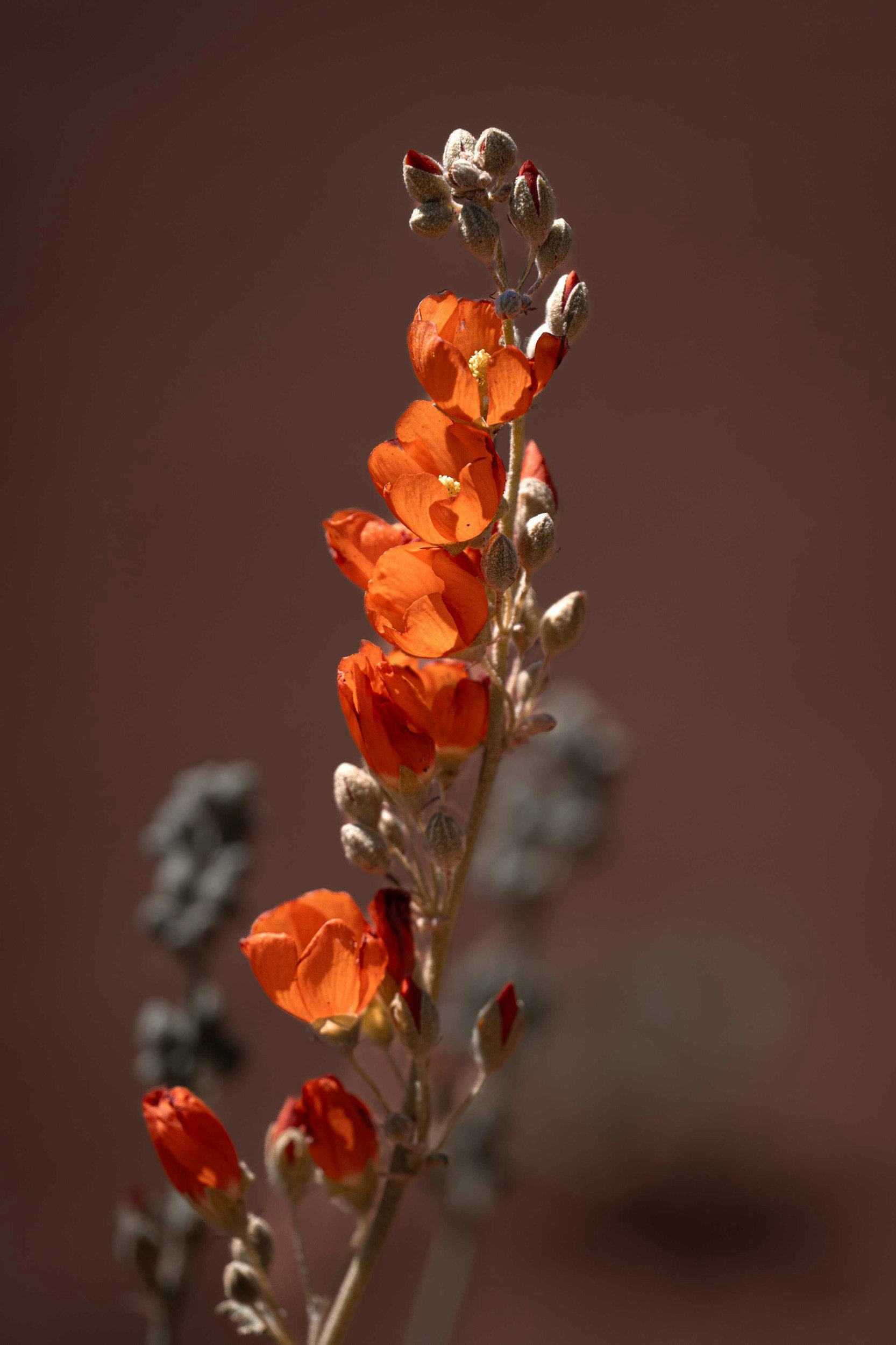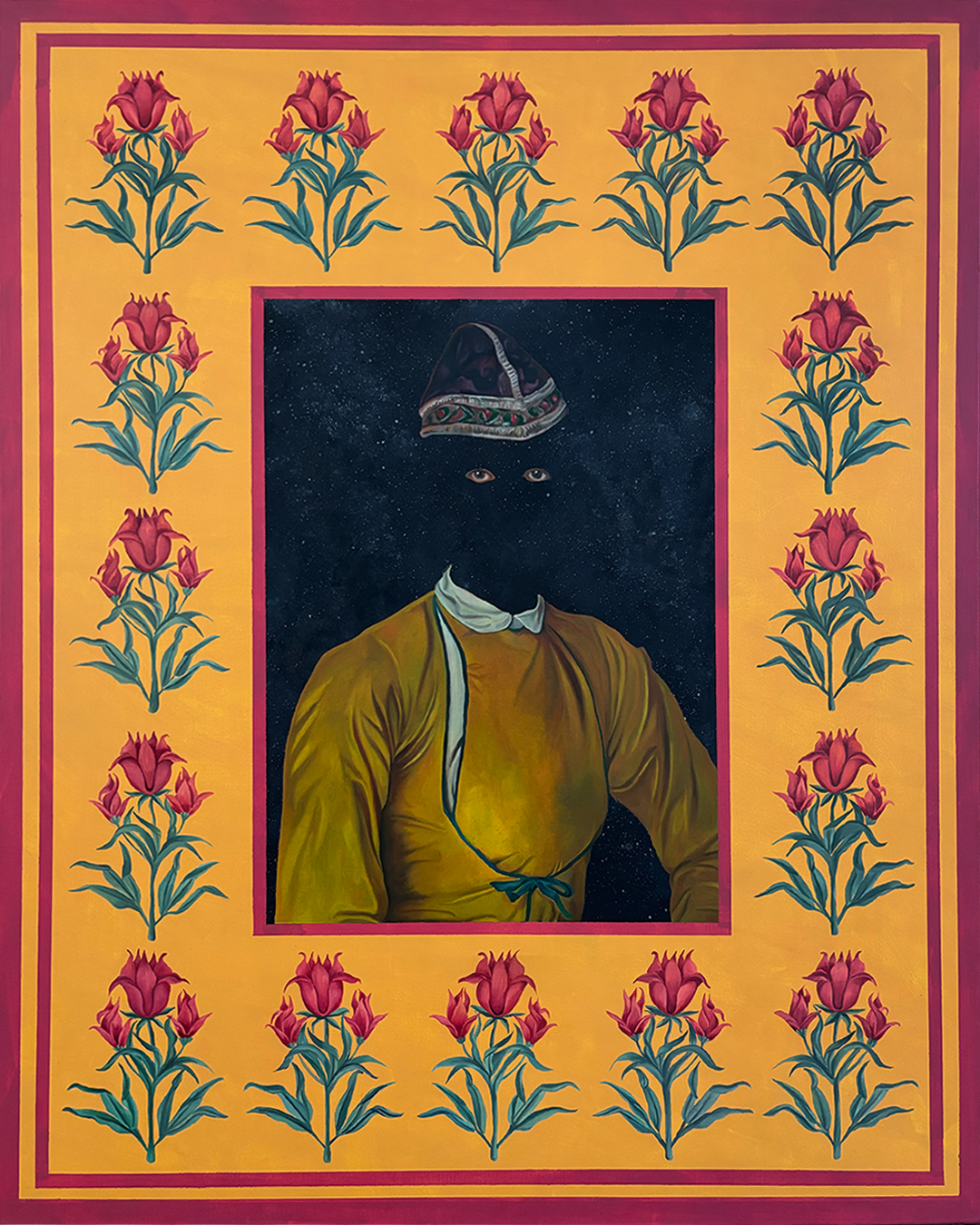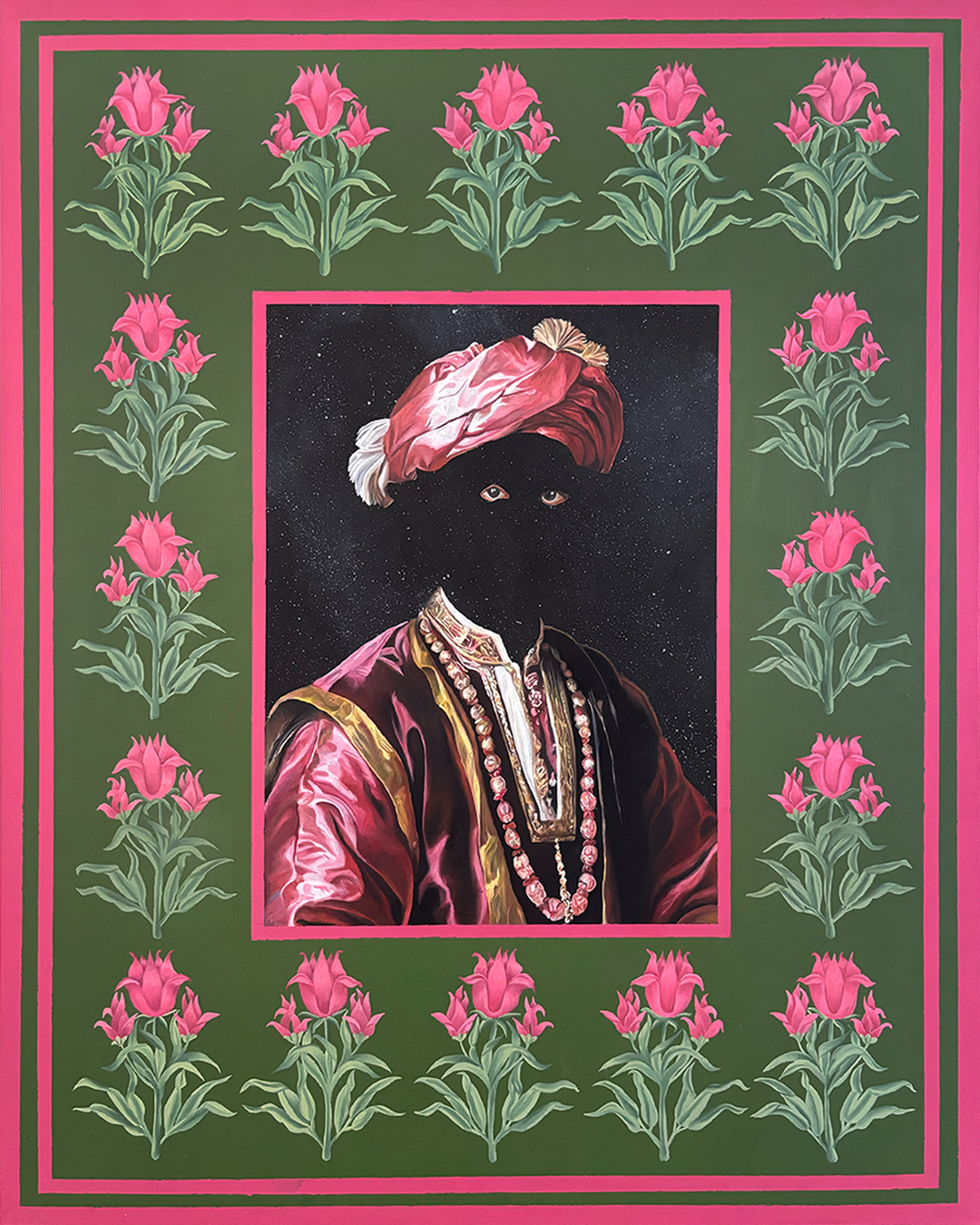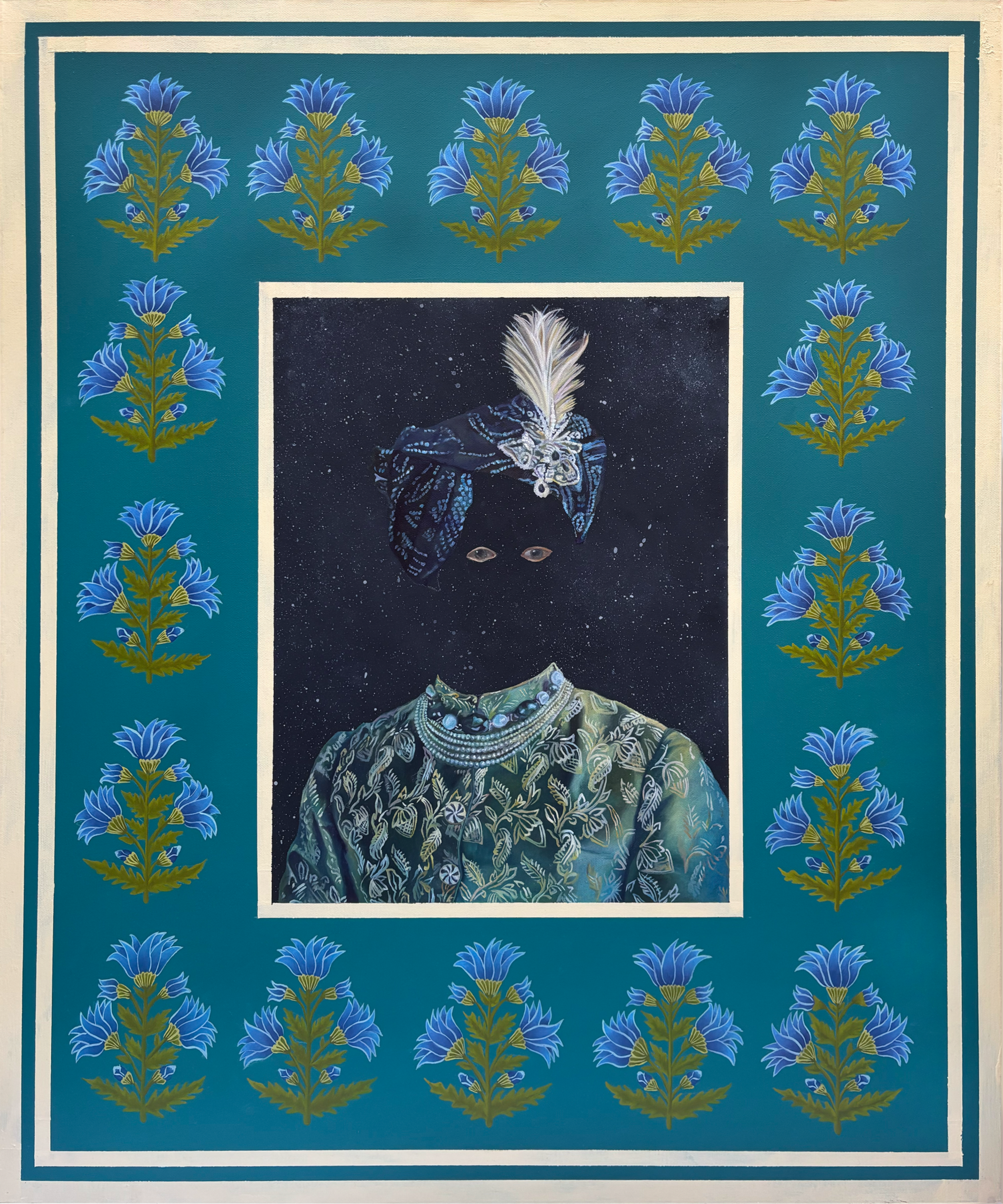Masthead
Editors
Lisette Boer
Ayling Zulema Dominguez
Dylan Gilbert
Haden Riles
Editorial Directors
Stephanie Berger
Jackie Braje
Tova Greene
Editors-in-Chief
Leon Barros
Natalee Cruz
Managing Editor
F.M. Papaz
Editor’s Note
Dear Readers,
what up
Yours truly,
Leon Barros
Natalee Cruz
Editors-in-Chief
Ashia Ajani
DEPRECIATION
For my birthday, I almost ask my partner for a stock pot. I’m
approaching that auntie age, where I am responsible for orchestrating
the cookout, not the mess that follows. Summer’s ‘round the corner,
its red, sticky heat loosening my leave out, and I’ve gotten too
grown for drinking water from the hose. I sneak a sip anyways.
Black nostalgia is a burning archive, a seasoned pan collecting dust.
Along the cutting board, a change of heart. I tell him it’s something
you’re supposed to inherit, like a machete or a plot of land but
everyone keeps running further away from a crumbling foundation –
when reassembled, pictures become strange fiction. Nothing lasts
except the music, so we keep remixing records in hopes that new sounds
spark energy, energy! Even Big Momma got tired sometimes, we so greedy
trash cans know all our secrets. Plants are losing their appetite for
carbon sequestration; this country’s monotonous in its pillage.
Call this parsimony a recession indicator. Community is a hardwon
ceremony, a burnt roux satisfying old cravings. The pot bubbles –
like Stevie, storytelling is only held up by melody. Africa
passes through me like sea water. My soul, a sieve. We are losing
recipes. We are losing revolutionaries, though I suspect the two are
interwoven. I have no mouths to feed and too many to mourn.
Collards connect our diaspora better than hypertension. My granny died
sitting up at the dinner table. My cousin, on his way to chow. Someone
caught a cold or a bullet or was given the wrong prescription, had a
complication, was disappeared by a democratic government, failed their
piss screening, found evidence of lead in the soil, stuck in a burning house,
beat, beat, beat, pulled fungi from their ribcage and named it medicine.
At the grocery store, workers eye my basket. Pageantry without much
substance. I reach for smoked turkey legs, its brownness seductive.
We, the dark part of the meat, excised. Cast to cattle feed. Isn’t it
ironic, the way one death nourishes another. Even I am hungry
for something I can’t quite name. The first instrument: the tongue.
Did language get in the way of our belonging? The future speaks
in seedlings. I just want to eat my blues. I just want to find a way
to speak without talking. To let the grass linger a little longer.
AND HERE, A PLATE OF BLACKBERRIES
she doesn’t mind the thorns
the thorns precede the blossoms
which give way to the best part:
fruit every effort reaches towards
this moment, meeting of sun
& skin beginning, ending with seed
if i say fruit is the deepest iteration
of love then feeding you this
ambrosia is an act of preservation
because blackberry crop hardly ever
fails, it reminds us of what it means
to persist & keep on keeping on
foraging on land that is not yours but
you are nevertheless bound to suggests
you are just returning to get back
what’s owed to you like juice like
blackness memory stains stolen
land sticking our fingers pricking
our wrists red she imagines her
desire to be a balm when black
bottom ends fray & terror wipes
your mind clean calls your hunger
lazy craves something stronger
than sugar substitute the field
holds what refuses to be contained
in between bites of bounty we
discuss the necessity of theft in a
pilfered world, thumb & index
inked palms like oil spills let syrup
dribble from our lips like old country
roads winding “home” this pursuit
our penance bramble bruising our
wildest appetites at midnight
the forest’s edge sweats & butterflies
& bosoms & bleeds nectar like
offerings utters simple whispers of
a country soon to be
Forgotten
Ashia Ajani is a sunshower, a glass bead, a carnivorous plant, an overripe nectarine. Hailing from Denver, CO, Queen City of the Plains and the unceded territory of the Cheyenne, Ute and Arapahoe peoples. They are the author of one collection of poetry, Heirloom (Write Bloody Publishing, 2023) and a forthcoming collection of lyric essays Tending the Vines (Timber Press, 2026). Ashia's writing is a kaleidoscope of her work as an eco-griot and abolitionist.
Pradhitha Boppana
THE OPPOSITE OF ABANDONMENT IS OFTEN
When I love
you, you make me
want to know a word
through you. To run along its palm
and crease where we say for each other:
I think about you
often.
The tumble rush of knowing
I can repeat somewhere
like the dishes or goodbye. Somewhere meaning you.
In my mouth you are friendstamped
I repeat soft knocks from my body to yours
meaning hanging up a roof for us
somewhere meaning me.
It is good to see you
often.
I mouth this to myself. I also want
to know how to remember myself
on the train where
I go blank daily. It is possible to be buried
somewhere, on purpose.
I should have been angry when
you said home
is simple, but
I broke like an echo– can we
do this
often
I found my hands can
make my face disappear.
You found that you can invite some
one in and then figure the rest out.
Yes, you can change me.
I’ll spill over on our table like morning.
Pradhitha Boppana is a poet urging you to check out lifeline4gaza.com to support a Palestinian family. She is a student of poetry as a tool for imagining the world that is to come, and iterating that vision into practice. She recently graduated with a degree in English and Race, Indigeneity, and Migration from the University of Texas at Austin and her poetry received the Parker Prize. She desires her relationships to be a driving force in her life and you will most likely find her fondly petting a cat.
SOL MATES
Maxochitl Cortez
written alongside Laurena Salinas
I am not
a tumbleweed in the wind
I am the wind
I could be
a lotus in the mud
Look like the mud
I was a coral
reef once a home
for a starfish
I remember
the liberation
of the ocean
atecocolli melodies
ring we are swimming jaguars
guarding stories
of grandpa peyote
I am a tuna
a home to two
nesting colibris
watching bison
by the tumbleweed
we are coyohmeh
in the night
desert sand skin
on mountains
tumbleweed clouds
cuauhtli soaring
beyond sunsets
into spirit
world they are
the arctic wolves
coats thick as snow
water and life
we are
We met under Ānua. We come from mezquitl, sacred waters, tāp tāi. Storytelling is a means of liberation for restoring our life ways. We are of the sacred gardens. Maxochitl is a two spirit Indigenous Resistance Artist, Educator & Organizer guided by the calls to action for collective liberation. They serve the board of every.Word Poetry, amplifying Spoken Word Poets in Austin TX & serve multiple organizations as a Teaching Artist rooted in resistance. Laurena Salinas (she/her/ella) is an infinite learner and guardian of the natural world. She is Indigenous to the Coahuiltecan lands and waters of Ajehuac Yana in San Marcos, Tx. She is an Outdoor Education Specialist and youth mentor. Collective liberation and indigenous pedagogical practices are the pillars of her commitment to BIPOC youth and communities.
ODE TO BIG EASY
Jay Délise
Swole from heat that won’t turn us loose
Keep us from running too fast
Like horn-blowing-streetcar-heavy-petting
Like sun come
To play the groove smooth
To sweet the sweet tea
To sway off oak trees, catching
The only breeze coming for another hour
So the dough just rose, and the grease still hot
And the band plays on...
Jay Délise (they/them) (official jester of Sugar Hill) is a writer, performance artist, and eater of grapes, based in Harlem, New York. They have performed at The United Nations, The Schomburg Center, Judson Church, The Pulitzer Center, and Roundhouse. Their 2020 self-published poetry collection “tenderhead.” debuted at #1 in poetry audiobooks on Libro.fm and their work has been featured in publications including Glass Poetry Press, Huffington Post, Lucky Jefferson, AFROPUNK, Vagabond City, and Triangle House. Jay has been a teacher and clown consultant/director for almost a decade (old), and their work smells of mischief, church giggles, and being barefoot on unfinished hardwood floors. They enjoy stealing from white people, bad wigs, being gay, fart jokes, jazz music, free art, assuming their mother/father wounds are undetectable, and writing poems about them anyway.
SPLIT/SECOND
Ebony Kenae
Undo the h-
earth splendid second be-
fore an epiphany ex-
its the air. The fault-
err of a split, ground-
breaking the way your lips
tilt me onto my ax-
is, the subtle dive/
ine witnessed from my own eyes
a drowning of my-
selfish existence, a pleasure
to beg-
in. I have always been here
tical and a believer, messy
in the practicum of my faith. But, this moment-
um builds my undoing
As God blesses me with hailing
truth, harbinger of my little sins.
Mickie Kennedy
MAPPING THE SPREAD
Flat on the slab, shimmying my shorts to my knees.
My metal zipper would obscure
the image. I thought I would feel the usual
shame, but I don’t. Inert, like clay. I stretch
my arms above my head and hold them there, a pinch
in both my shoulders. The machine
whirs, almost motherly,
and I enter the plastic donut of its eye.
Because they need to scan the space
between my neck and groin, the table shifts
in millimeter increments. I’m not
allowed to move. I close my eyes, and everything
is purple. A lavender rash. The tracer
beneath my skin, radioactive,
hunting the profligate cells. An itch
on my thigh harasses my mind
for a minute, then fizzles—a pixel in my brain
burning out. The table crawls its fractured inch.
Purple again, a sea of neon plum,
like the space between the trees
when a sliver of lightning syringes a pine.
ANOOS GOOSE
a whisk-it a whack-it a wontoon daily
placard an indigo art plea’s
palatial grist a slavendar sleeve
at every outcrop an outcry a lime a lie
to be swimmed again the very nantucket
of the brine a wopen-clad umbicle
unbuckling his beet purple
sartusian the bride in lace-shackled cleats
TWELVE YEARS DEAD
Two waves coaxing their way to the shore. Beach grass
and driftwood. So much time. I place him here
no longer. Lone road of crushed shell we used to walk,
for inspiration. The texture of compaction
as we stepped. Twitching on the water—moonlight
like stretched pennies. In the distance,
an owl pares an apple of a mouse with its eyes.
Mickie Kennedy is a gay writer who resides in Baltimore County, Maryland. His work has appeared in POETRY, The Threepenny Review, The Southern Review, The Sun and elsewhere. His chapbook Glandscapes, published by Button Poetry, can be ordered at Glandscapes.com. Follow him on social media @MickiePoet or his website mickiekennedy.com.
Patty Paine
ALSO BLUE
DEEP FOREST
FAR OFF
Patty Paine is the author of Grief & Other Animals, The Sounding Machine, and three chapbooks. Her writing and visual work have appeared in Blackbird, Adroit, Gulf Stream, The Denver Quarterly, Analog Forever, Lomography, Hayden's Ferry Review, and other publications. She is the founding editor of Diode Poetry Journal, and Diode Editions.
Sid Pattni
A BORROWED MYTH I
A BORROWED MYTH II
A BORROWED MYTH III
A borrowed myth (I, II & III) is a series that examines the legacies of colonial rule and their enduring impact on identity, memory, and cultural inheritance within the Indian diaspora.
The British colonisation of India was a system built through strategic conquest, economic domination, and the erosion of indigenous sovereignty. One such instrument of control was the Doctrine of Lapse (1848), a policy that allowed the British East India Company to absorb princely states lacking a direct male successor, effectively dissolving centuries of dynastic autonomy.
In my work, the faceless prince emerges as a spectral figure — not simply as an individual but as a stand-in for countless rulers whose power and identity were systematically erased. These portraits serve as meditations on the psychological and cultural dismemberment wrought by colonial intervention.
The central figure is enveloped in a richly ornate floral frame, borrowing from the language of 17th and 18th century Indian miniature painting. Once a symbol of intricate storytelling and courtly identity, the miniature tradition was later co-opted and reshaped under colonial gaze to accommodate Western aesthetics. My work seeks to subvert and expand its formal boundaries. The work considers how visual culture can both preserve and distort memory — and how diasporic identity continues to reckon with the visual residue of empire.
ALL HAIL THE QUEEN
All Hail the Queen! is part of a continuing series that interrogates the intricate interplay between identity, colonial histories, and diasporic experience. Central to this work is the figure of Queen Victoria, a potent symbol of British imperial authority and cultural hegemony. During the height of colonisation in India, there were more statues of Queen Victoria erected across the country than there were Indian people serving in the upper echelons of civil service. In this context, the Queen becomes both an emblem of domination and a mechanism of erasure—an omnipresent reminder of the West’s imposition upon the Indian psyche and public space. In doing so, she reshaped the narratives of the colonised, dictating how they were perceived externally and how they came to perceive themselves.
SELF-PORTRAIT
(THE ACT OF PUTTING IT ALL BACK TOGETHER)
This work explores the complexities of identity, focusing on how I come to understand myself through visual languages shaped by orientalist and colonial histories. The work borrows and adapts imagery from a range of sources including Company Paintings, botanical drawings and Mughal miniatures, and puts disparate pieces from these works back together. Crucially, they’re about getting it wrong – producing pictures that speak of the here and now. I’m very attracted to the cycle of collapsing interpretations, telling a story of how India is perceived externally and how generations of Indians came to internalise and inhabit Western projections of “Indian-ness” today. Ultimately, my portrait is not a fixed statement but a dynamic exploration of identity which is a constant negotiation between inherited histories and the lived realities of the here and now.
Sid Pattni is an Australian artist of Indian descent whose practice interrogates the visual legacies of colonisation and their impact on diasporic identity. Born in Kenya to Indian parents, he migrated to Australia at age 13. His work reconfigures Mughal miniatures, Company paintinggs, colonial archives, embroidery, and botanical illustration, weaving these visual traditions into composite languages that examine how aesthetics shaped under empire continue to frame cultural memory, belonging, and identity. Pattni has been a finalist in the Archibald Prize (2025), the Lester Prize (2020, 2024, 2025), and the National Emerging Artist Prize (2024). He was awarded the Kennedy Prize (2023) and Flinders Lane Emerging Artist Award (2023) and has exhibited widely, including at India Art Fair (2025) and Sydney Contemporary (2025). He recently presented a sell-out solo exhibition at Michael Reid Sydney and his works are held in both public and private collections across Australia.
Melanie Robinson
GENTLEMEN, PLEASE
Melanie Robinson’s poetry and visual art grapple with the complexities of mental health and performative femininity. She holds an MFA in poetry from Texas State University and was the 2019-2020 Poet in Residence at the Clark House. Her work has appeared in Polyester Magazine, Rust + Moth, Radar, and more.
AFTER THE ONLYFANS COLLAB
A photographer stops you on the pier.
He wants your portrait.
Everyone does.
The distant thump of volleyballs on skin.
The shutter-click. The photographer’s Yes,
yes. You look as if you are
in pain—lifting your hand
to shield your eyes, your pit
a sudden mouth in the too-bright noon.
Beneath us, empty seltzers bob in yacht-wake.
The gays seethe in their colorful speedos.
Just hours earlier, we fucked
while your roommate filmed. I forgot
which body was mine. You forgot my name
and called me Ash. It was business,
but it wasn’t. It was love,
but it wasn’t. A lifeguard oars
across the lake. The photographer drops
to his knees—eager, but somehow not
embarrassing. I didn’t know you,
but now I do.
FAGMENT 18
are the veggies from Veggie Tales
misogynistic?
do they take Viagra
to keep from wilting?
hard seltzer
in a soft mouth
all the bottoms
signify their bottomry
with mesh tops
all the tops
signify their toppery
with booty-short bottoms
we wear
what we aren’t
we wear
what we want
my throat
is the Tunnel of Love
Josh Tvrdy
THE OPENING OF THE SIXTH SEAL
I moon the moon.
It moons me back.
How’d you get your cheeks
so round, I ask.
I squat the image
of earth, it says. I wonder
what an image weighs.
For example: Katy Perry
edging space in baby
blue, feeling very
connected to love
as she holds a daisy,
the name of her literal baby—
that must weigh less
than an image
of the earth.
What will you squat
when the earth is gone,
I ask. The moon
does not respond.
I’d like to eat your beautiful
cheeks, I tell the moon,
and the moon
turns red as blood.
Josh Tvrdy is a writer, editor and teacher from Tucson, Arizona. Winner of Button Poetry's 2023 Chapbook contest, his chapbook, Smut Psalm, is available now. Winner of a 2021 Pushcart Prize, his work can be found in AGNI, Image Journal, POETRY and elsewhere. He lives in Raleigh, North Carolina.





















